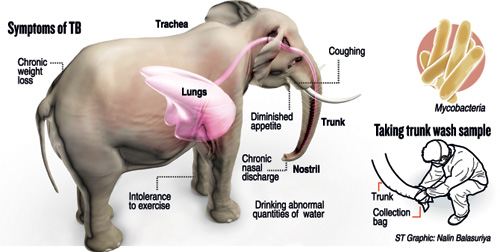News
Captive elephants helpless against TB spread
View(s): Experts fear there could be an outbreak of tuberculosis among captive elephants if quick action is not taken.As elephants in Dehiwala Zoo show signs of TB the zoo authorities have stopped the popular elephant performances.Zoo director Anura de Silva told The Sunday Times that five out of the zoo’s 10 elephants have tested positive in a preliminary TB anti-body test but further tests were needed to confirm a TB diagnosis.“The elephant dance is a public event that is enjoyed by children so we were compelled to stop it as a precautionary measure,” said Mr. De Silva.A group of workers staged a protest on Thursday saying the show should not be stopped. They said the advice of veterinary surgeons had been questionable in the past so the authorities should wait for solid evidence that these elephants were TB positive.
Experts fear there could be an outbreak of tuberculosis among captive elephants if quick action is not taken.As elephants in Dehiwala Zoo show signs of TB the zoo authorities have stopped the popular elephant performances.Zoo director Anura de Silva told The Sunday Times that five out of the zoo’s 10 elephants have tested positive in a preliminary TB anti-body test but further tests were needed to confirm a TB diagnosis.“The elephant dance is a public event that is enjoyed by children so we were compelled to stop it as a precautionary measure,” said Mr. De Silva.A group of workers staged a protest on Thursday saying the show should not be stopped. They said the advice of veterinary surgeons had been questionable in the past so the authorities should wait for solid evidence that these elephants were TB positive.
TB is caused by mycobacteria and animals can get infected by the same bacteria that cause TB in humans, so there is a possibility that sick animals or humans could pass the disease to each other through body fluids. TB spreads through the air on infected droplets that are aerosolised when an infected person or animal sneezes, coughs, or in the case of an elephant, sprays. Captive elephants can get TB by inhaling infected droplets from infected humans or other infected elephants.
Elephant-to-elephant transmission may occur when one elephant places its trunk inside another elephant’s mouth – a common practice.Asked if the decision to halt the elephant dance should have been taken earlier, Mr De Silva said, “There is nothing to panic. We have checked all the 12 mahouts who handle the zoo elephants but none of them were positive for TB. Mahouts are the first line of contact with elephants living very close to these captive elephants.”
Elephant activists warn that Sri Lanka’s captive elephants have been at risk of a TB outbreak for some time. The issue became highlighted last year when two elephants from the Pinnawela Elephant Orphanage tested positive for TB. Dr. Anoma Siribaddana, Consultant Respiratory Physician, said her unit has been continuously screening mahouts, especially in Pinnawela after reports of a possibility of a TB outbreak.It is suspected that the death in February of the Waweladeniye Raja – a majestic tusker entrusted to carry the casket of the Dalada Maligawa – was caused by TB.
The chief monk of the Weweladeniye Temple did not allow a post-mortem, saying it was cruel to cut up a majestic tusker.“This denied us the chance to prove the exact cause of the tusker’s death,” lamented Dr. Ashoka Dangolla, a senior lecturer attached to the Veterinary Faculty of the University of Peradeniya, who found that the animal could be TB positive based on a blood sample taken a year before its death.
Raja was chained up with other Maligawa elephants during the last Dalada Perahera in Kandy, so there is a high chance that the other elephants could have been infected.The first case of TB in elephants in Sri Lanka was reported by Dr. Dangolla himself about eight years ago, in an elephant named Mata. In humans, the signs of TB include weakness, weight loss, exercise intolerance and coughing. Elephants too can show weight loss and leaking of some nasal fluids but may not show signs until the disease is quite advanced.
There is a need to test all the captive elephants in Sri Lanka but activists fear some elephant owners might hesitate to do so and administer proper medication as the TB treatment for elephants are expensive – the daily drug dose costs Rs. 10,000-15,000. Dr. Dangolla says this is not a situation for panic, and he is trying to organise a meeting with the Association of Captive Elephant Owners to take measures.The Sunday Times recently reported that Sri Lanka is becoming a hub for TB as the number of cases increases.
Trunk wash the surest test
It is not easy to check whether an elephant is TB positive. When infection from TB sets in the body starts creating antibodies to fight the intruder. However, the increase of antibodies can occur due to other factors too, and could also mean the body’s immune system could beat the bacteria and the infection could be defeated.
So vets recommend a test known as Trunk Wash to be 100 per cent sure that an elephant is infected with TB. The trunk of the elephant is filled with saline water, then the trunk is elevated and the elephant is instructed to forcibly exhale into a collection bag. Obtaining an adequate trunk wash sample is not easy according to elephant handlers as some elephants do not permit their trunk to be handled and not all can be trained to forcibly exhale.
The resulting sample may be from the end of the trunk instead of from deeper in the respiratory tract as intended. A research paper published on Journal of Commonwealth Veterinary Association’s 2012 January issue indicate that attempts to collect trunk wash from 60 captive elephants failed.

